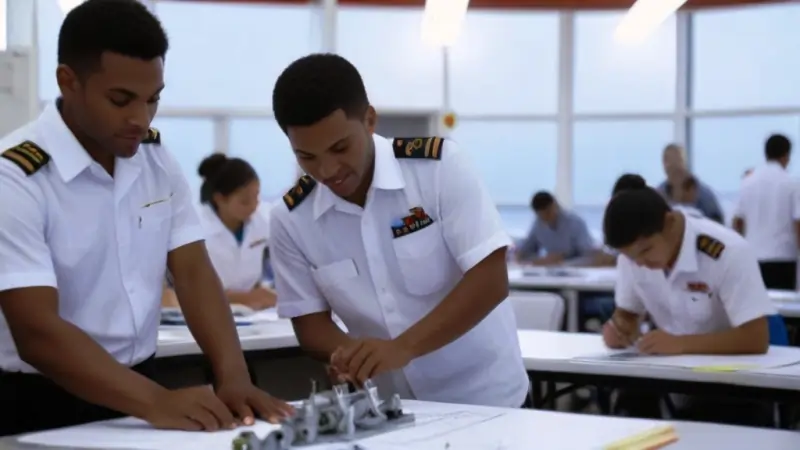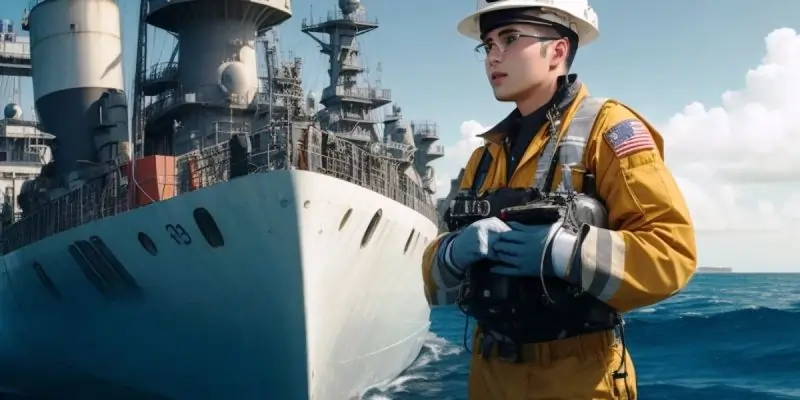The Life Of A Marine Engineer
“Every day at sea is a new challenge,” says Captain Alex Martinez, a seasoned Marine Engineer with over two decades of experience. “You never know what the ocean will throw at you.”
Marine Engineers are the backbone of maritime operations, ensuring that ships run smoothly across the world’s oceans. They are responsible for the maintenance and repair of all mechanical and electrical systems on board, from engines to navigation systems. Their expertise is crucial in preventing mechanical failures that could lead to dangerous situations, ensuring the safety of both the crew and cargo.
These engineers face unique challenges, working in confined spaces and dealing with the unpredictable nature of the sea. Their ability to troubleshoot and solve complex problems under pressure is what keeps the maritime industry moving. Join us as we dive into the fascinating and demanding world of Marine Engineers, exploring their daily lives and the pivotal role they play in global trade and travel.
Chapter 1: The Journey Begins
Early Interest
Marine engineering often captures the imagination of young minds with its blend of adventure, technology, and the open sea. For many Marine Engineers, the journey begins with a fascination for ships and how they work. This early interest can be sparked by various influences such as family members who work in maritime industries, inspirational books, or even visits to ports and maritime museums. The allure of understanding and controlling the powerful machinery that drives enormous vessels through vast oceans becomes a compelling dream.
Education and Training

Turning this dream into reality requires a solid educational foundation and rigorous training. Aspiring Marine Engineers typically pursue a degree in marine engineering or a related field, which covers subjects like marine propulsion, electrical systems, fluid mechanics, and thermodynamics. Universities and maritime academies offer specialized programs that combine classroom instruction with hands-on training. Cadet programs, internships, and apprenticeships are integral, providing practical experience on ships and in shipyards. These programs are designed to equip students with the technical skills and problem-solving abilities essential for their future careers.
First Voyage
The first voyage is a pivotal moment in any Marine Engineer’s life, marking the transition from theory to practice. It’s a blend of excitement and trepidation as the young engineer steps aboard a vessel for the first time, ready to put their knowledge to the test. The initial days are filled with awe as they explore the ship’s engine room, familiarize themselves with the equipment, and begin to understand the dynamics of life at sea.
However, the excitement is often accompanied by challenges. The confines of the ship, the constant motion of the sea, and the demanding nature of the work can be daunting. Adapting to the ship’s schedule, which often includes long hours and shift work, requires resilience and determination. Yet, it’s during these early voyages that Marine Engineers truly find their footing, learning to navigate the complexities of their role and building the confidence needed for their careers.
Chapter 2: Life at Sea

Daily Routine
Life at sea for a Marine Engineer is characterized by a structured yet demanding daily routine. The day typically begins early, often with a briefing session to discuss the tasks and potential issues for the day. After this, the engineer heads to the engine room for a thorough inspection of all machinery. This includes checking the engines, generators, and other critical systems to ensure they are operating smoothly.
Throughout the day, the Marine Engineer performs various maintenance tasks, such as lubricating moving parts, tightening bolts, and replacing worn-out components. There are also regular checks on the fuel and lubrication systems, monitoring the levels, and ensuring the quality of the fluids used. The engineer must also keep detailed logs of all activities, noting any irregularities and actions taken.
In addition to routine maintenance, the engineer may be called upon to troubleshoot and repair unexpected issues that arise. This requires quick thinking and the ability to diagnose problems accurately under pressure. Meal times and short breaks provide brief respites, but the day is generally long, often stretching into late hours if emergencies occur.
Responsibilities
The responsibilities of a Marine Engineer are vast and critical to the vessel’s operation. They are primarily responsible for the maintenance and repair of the ship’s engines, boilers, pumps, and other mechanical and electrical systems. This includes:
- Engine Maintenance: Regular servicing of the main propulsion engines and auxiliary engines to ensure they run efficiently.
- Electrical Systems: Monitoring and repairing the ship’s electrical systems, including power generation and distribution, navigation equipment, and communication devices.
- Machinery Operation: Overseeing the operation of pumps, compressors, and other machinery essential for the vessel’s functionality.
- Safety Systems: Ensuring that all safety systems, such as fire suppression and emergency power, are operational and meet regulatory standards.
- Inventory Management: Keeping track of spare parts, tools, and supplies, and ensuring that critical components are always available.
- Environmental Compliance: Monitoring and maintaining systems that manage waste and emissions to comply with environmental regulations.
Challenges
Marine Engineers face numerous challenges that test their skills and resilience. One of the most common challenges is dealing with technical issues that can arise at any time. Diagnosing and fixing mechanical or electrical failures in the middle of the ocean, without immediate access to spare parts or external help, requires ingenuity and resourcefulness.
Weather conditions also pose significant challenges. Rough seas and storms can make it difficult to perform even the simplest tasks, increasing the risk of accidents and injuries. The constant motion of the ship can also affect the engineer’s ability to work efficiently and safely.
Another major challenge is the prolonged periods away from home. Marine Engineers often spend months at sea, separated from their families and familiar environments. This can lead to feelings of isolation and loneliness. Maintaining mental health and morale is crucial, and engineers often rely on strong camaraderie among the crew, regular communication with loved ones, and personal hobbies or routines to cope.
In conclusion, life at sea for a Marine Engineer is a blend of routine maintenance, critical responsibilities, and overcoming various challenges. Their role is essential to the safe and efficient operation of the vessel, requiring a unique combination of technical expertise, problem-solving skills, and resilience.
Chapter 3: Overcoming Adversity
Technical Problems
Marine Engineers frequently encounter technical problems that require immediate and effective solutions. One notable instance involved a sudden engine failure in the middle of a transatlantic voyage. The main engine, critical for propulsion, stopped working due to a malfunctioning fuel injector. The ship was adrift, and the crew’s safety depended on the quick resolution of the issue. The Marine Engineer, with years of experience, quickly diagnosed the problem and coordinated with the crew to replace the faulty injector using onboard spares and tools. Within hours, the engine was up and running, averting a potentially dangerous situation and ensuring the ship’s journey continued smoothly.
Another challenging scenario involved a malfunction in the ship’s electrical system, causing a blackout during a night crossing. The Marine Engineer had to work in complete darkness, using only emergency lights and handheld tools, to identify a short circuit in the main power distribution board. By methodically isolating sections of the circuit and replacing damaged components, the engineer restored power, highlighting the importance of technical knowledge and calm under pressure.
Emergency Situations
Marine Engineers play a critical role during emergencies, ensuring both the safety of the crew and the ship’s functionality. One harrowing experience involved a fire in the engine room caused by an oil leak. The quick-thinking Marine Engineer immediately activated the fire suppression system and coordinated with the crew to contain the fire. Simultaneously, they worked to shut down the affected machinery to prevent further fuel from feeding the flames. Their decisive actions and thorough understanding of the ship’s emergency protocols were instrumental in extinguishing the fire and minimizing damage.
In another incident, a severe storm caused significant flooding in the lower compartments of the ship. The Marine Engineer led the effort to operate the bilge pumps and seal leaks, preventing the vessel from taking on more water. Their expertise in managing the ship’s pumping systems and structural integrity was crucial in keeping the ship afloat and ensuring the safety of everyone on board.
Adaptability and Skills
The life of a Marine Engineer demands a high degree of adaptability and continuous learning. Each day at sea presents new challenges, requiring engineers to think on their feet and apply their skills in diverse situations. The ability to adapt to changing conditions, whether it’s dealing with mechanical failures, adverse weather, or emergencies, is vital.
Problem-solving skills are at the core of a Marine Engineer’s role. The ability to quickly diagnose issues, devise effective solutions, and implement them efficiently can mean the difference between a minor hiccup and a major catastrophe. Continuous learning is also essential, as technology and maritime regulations constantly evolve. Marine Engineers must stay updated with the latest advancements in marine technology, safety protocols, and environmental regulations.
Chapter 4: The Impact on Personal Life
Family and Relationships

The life of a Marine Engineer often means long periods away from home, which can significantly impact personal relationships and family life. Extended voyages, sometimes lasting several months, create physical distance that can strain connections with loved ones. Marine Engineers miss out on important family events, such as birthdays, anniversaries, and holidays. This absence can lead to feelings of guilt and a sense of missing out on life at home.
Spouses and children of Marine Engineers also face challenges. The absence of a partner or parent requires them to manage household responsibilities alone, which can be stressful and overwhelming. Maintaining strong communication is essential, but even with modern technology, time zone differences and limited connectivity can make regular contact difficult. Despite these challenges, many families develop resilience and find ways to support one another through these periods of separation.
Coping Mechanisms
Marine Engineers develop various coping mechanisms to handle the isolation and stress of long voyages. One crucial strategy is maintaining a routine that includes regular exercise, hobbies, and social interactions with fellow crew members. Physical activity helps reduce stress and improve mental health, while hobbies such as reading, writing, or even learning new skills can provide a sense of accomplishment and distraction from the monotony of daily life at sea.
Staying connected with family and friends through emails, video calls, and social media, when possible, helps reduce feelings of isolation. Many engineers keep journals or blogs to document their experiences and share them with loved ones, creating a bridge between their life at sea and life at home.
Another effective coping mechanism is focusing on professional development. Marine Engineers often use their time at sea to study for further certifications or learn about new technologies in their field. This continuous learning not only enhances their career prospects but also keeps their minds engaged and motivated.
Support Systems
Support systems are vital for the well-being of Marine Engineers, both onboard and offboard. Onboard, a strong sense of camaraderie among crew members can provide emotional support and companionship. Regular team-building activities, social events, and mutual support during challenging times help foster a positive and supportive environment. Many ships have designated welfare officers or counselors who can provide assistance and resources for those struggling with mental health issues.
Offboard, marine companies often offer various support services for their employees and their families. These can include counseling services, family support programs, and regular communication updates about the ship’s status and the engineer’s well-being. Some companies also facilitate periodic family visits to ports where the ship docks for extended periods, allowing Marine Engineers to reconnect with their loved ones.
Professional organizations and maritime unions also play a crucial role in providing support. They offer resources, advocacy, and a sense of community for Marine Engineers, helping them navigate the unique challenges of their profession.
Chapter 5: Innovations and Future Prospects
Technological Advancements
The marine engineering field has seen significant technological advancements in recent years, revolutionizing the way ships are built, operated, and maintained. One of the most notable developments is the integration of automation and digitalization. Advanced control systems now allow for remote monitoring and operation of shipboard systems, enhancing efficiency and reducing the need for manual intervention. These systems collect vast amounts of data from various sensors on the ship, enabling predictive maintenance and real-time decision-making.
Another major advancement is the adoption of alternative propulsion systems. LNG (liquefied natural gas) engines, hybrid electric systems, and even fuel cells are becoming more common, reducing the reliance on traditional diesel engines. These technologies not only improve fuel efficiency but also significantly lower emissions, contributing to cleaner marine operations.
The use of advanced materials in shipbuilding is also transforming the industry. Lightweight, high-strength composites and corrosion-resistant alloys are being used to construct more durable and efficient vessels. These materials enhance the performance and lifespan of ships, while also reducing maintenance costs.
Sustainability Efforts
Sustainability has become a central focus in marine engineering, driven by stricter environmental regulations and a growing awareness of the impact of shipping on the planet. Efforts towards sustainable practices include the development and implementation of eco-friendly technologies and operational strategies.
One such effort is the optimization of hull designs to reduce drag and improve fuel efficiency. Modern computational fluid dynamics (CFD) tools allow engineers to create hull shapes that minimize resistance and enhance performance. Additionally, the use of energy-saving devices, such as air lubrication systems, helps reduce fuel consumption.
Ballast water management systems are being installed on ships to prevent the spread of invasive species across different marine environments. These systems treat ballast water before it is discharged, ensuring that harmful organisms are not introduced into new ecosystems.
Moreover, the maritime industry is exploring the use of renewable energy sources. Wind-assisted propulsion systems, such as rotor sails and kite sails, are being tested and deployed to harness wind energy and reduce fuel use. Solar panels are also being installed on ships to provide supplementary power for onboard systems.
Future Trends
Looking ahead, several trends are poised to shape the future of marine engineering and the role of Marine Engineers. One significant trend is the increasing use of artificial intelligence (AI) and machine learning. These technologies will further enhance predictive maintenance, optimize ship operations, and improve safety. AI-driven systems will analyze data from various sources to predict equipment failures, recommend maintenance actions, and even navigate the ship autonomously under certain conditions.
The move towards greater electrification of ships is another key trend. Fully electric and hybrid vessels are expected to become more common, driven by advances in battery technology and the development of efficient electric propulsion systems. This shift will not only reduce emissions but also change the skill set required of Marine Engineers, emphasizing electrical and electronic expertise.
Sustainability will continue to be a driving force, with the industry striving for zero-emission ships. The development of hydrogen fuel cells and the use of ammonia as a marine fuel are promising avenues being explored. These alternative fuels have the potential to significantly reduce greenhouse gas emissions, aligning with global decarbonization goals.
The role of Marine Engineers will evolve as these trends take hold. They will need to adapt to new technologies and continuously update their skills. The emphasis on digitalization, automation, and sustainability will require engineers to be proficient in data analysis, systems integration, and environmental management.
FAQ on “The Life Of A Marine Engineer”
Q: What is the primary role of a Marine Engineer?
A: Maintaining and repairing ship systems.
Q: How does a Marine Engineer handle technical problems at sea?
A: Quickly diagnose and repair issues.
Q: What are the main challenges faced by Marine Engineers?
A: Technical failures, bad weather, and long absences.
Q: How do Marine Engineers stay updated with new technologies?
A: Continuous learning and training.
Conclusion
The life of a Marine Engineer is a blend of technical expertise, resilience, and adaptability. From early interests and rigorous training to the daily challenges faced at sea, these professionals ensure the smooth and safe operation of maritime vessels. They navigate technical problems, manage emergencies, and adapt to the ever-changing conditions of life at sea, all while coping with the personal impacts of long voyages.
With rapid technological advancements and a growing focus on sustainability, the role of Marine Engineers continues to evolve. Embracing new technologies and sustainable practices, they are at the forefront of shaping a more efficient and environmentally friendly maritime industry.
As we look to the future, the role of Marine Engineers will become even more critical, ensuring the safe and sustainable navigation of our world’s oceans. Their dedication and skills are essential to the continued success and innovation of the global maritime industry.
